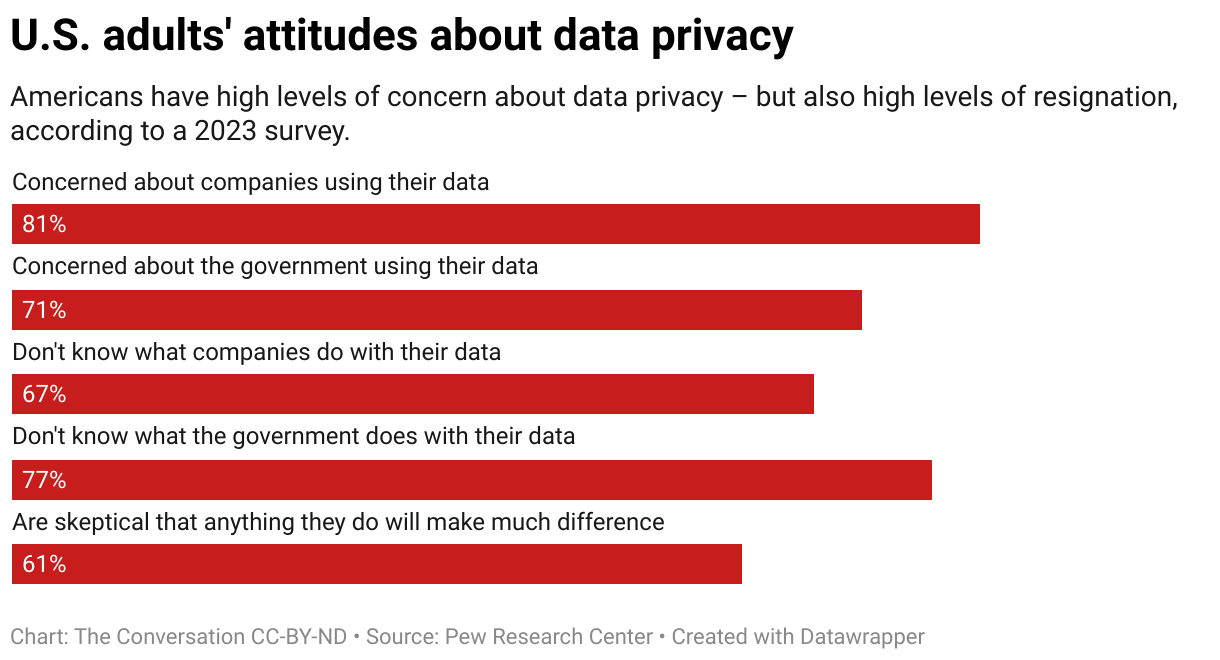When it comes to privacy, low expectations become reality
Description
By Rohan Grover and Josh Widera
The Conversation

When the Trump administration gave Immigration and Customs Enforcement access to a massive database of information about Medicaid recipients in June 2025, privacy and medical justice advocates sounded the alarm. They warned that the move could trigger all kinds of public health and human rights harms.
But most people likely shrugged and moved on with their day. Why is that? It’s not that people don’t care. According to a 2023 Pew Research Center survey, 81% of American adults said they were concerned about how companies use their data, and 71% said they were concerned about how the government uses their data.
At the same time, though, 61% expressed skepticism that anything they do makes much difference. This is because people have come to expect that their data will be captured, shared and misused by state and corporate entities alike. For example, many people are now accustomed to instinctively hitting “accept” on terms of service agreements, privacy policies and cookie banners regardless of what the policies actually say.
At the same time, data breaches have become a regular occurrence, and private digital conversations exposing everything from infidelity to military attacks have become the stuff of public scrutiny. The cumulative effect is that people are loath to change their behaviors to better protect their data − not because they don’t care, but because they’ve been conditioned to think that they can’t make a difference.
As scholars of data, technology and culture, we find that when people are made to feel as if data collection and abuse are inevitable, they are more likely to accept it – even if it jeopardizes their safety or basic rights.
Policy reforms could help to change this perception, but they haven’t yet. In contrast to a growing number of countries that have comprehensive data protection or privacy laws, the United States offers only a patchwork of policies covering the issue.
At the federal level, the most comprehensive data privacy laws are nearly 40 years old. The Privacy Act of 1974, passed in the wake of federal wiretapping in the Watergate and the Counterintelligence Program scandals, limited how federal agencies collected and shared data. At the time government surveillance was unexpected and unpopular.
But it also left open a number of exceptions – including for law enforcement – and did not affect private companies. These gaps mean that data collected by private companies can end up in the hands of the government, and there is no good regulation protecting people from this loophole.
The Electronic Communications Privacy Act of 1986 extended protections against telephone wire tapping to include electronic communications, which included services such as email. But the law did not account for the possibility that most digital data would one day be stored on cloud servers.
Since 2018, 19 U.S. states have passed data privacy laws that limit companies’ data collection activities and enshrine new privacy rights for individuals. However, many of these laws also include exceptions for law enforcement access.
These laws predominantly take a consent-based approach – think of the pesky banner beckoning you to “accept all cookies” – that encourages you to give up your personal information even when it’s not necessary. These laws put the onus on individuals to protect their privacy, rather than simply barring companies from collecting certain kinds of information from their customers.
For years, studies have shown that people claim to care about privacy but do not take steps to actively protect it. Researchers call this the privacy paradox. It shows up when people use products that track them in invasive ways, or when they consent to data collection, even when they could opt out. The privacy paradox often elicits appeals to transparency: If only people knew that they had a choice, or how the data would be used, or how the technology works, they would opt out.
But this logic downplays the fact that options for limiting data collection are often intentionally designed to be convoluted, confusing and inconvenient, and they can leave users feeling discouraged about making these choices, as communication scholars Nora Draper and Joseph Turow have shown. This suggests that the discrepancy between users’ opinions on data privacy and their actions is hardly a contradiction at all. When people are conditioned to feel helpless, nudging them into different decisions isn’t likely to be as effective as tackling what makes them feel helpless in the first place.






